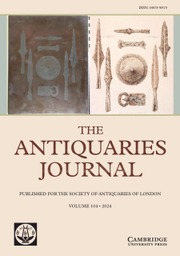Article contents
An Enamelled Bowl from Baginton, Warwickshire
Published online by Cambridge University Press: 08 January 2012
Extract
Even if the number of bronze bowls which constitute one of the brightest spots in the art of our Dark Age had remained at the respectable figure at which it stood a few years ago, British art could still boast of having furnished a most valuable contribution to the art of the period. But when we find added to this number two splendid examples in the space of three years we may well wonder what fresh revelation of the art may still be in store for future discovery, destined to illumine further the mystery that surrounds them and their origins. In 1931 the archaeological world was delighted by the Winchester bowl, as much on account of its perfect state of preservation as for the intricate workmanship of the scrolled designs on its escutcheons, even though these belonged to a type already familiar from numerous examples discovered in the past. Even so the variety of the patterns offers, as Mr. Kendrick has demonstrated, a most fascinating problem, one which he has gone far to solve, and yet, as he would be the first to admit, there are many points in their history that still remain obscure.
- Type
- Research Article
- Information
- Copyright
- Copyright © The Society of Antiquaries of London 1935
References
page 109 note 1 Antiq. Journ. xi, 3.
page 109 note 2 Antiquity, vi, 161 ff.
page 109 note 3 Collectanea Antiqua, ii, pl. xlii, 6, the lower fragment in fig. 10 must also belong to it.
page 110 note 1 F.C.H. Warwick, 1,257, coloured plate, fig. 5.
page 110 note 2 Archacologia, lxxiii, pl. xv, I.
page 111 note 1 Archaeologia, lvi, 40, fig. I.
page 111 note 2 Leeds, E. T., Celtic Ornament down to A.D. 700, 145, fig. 37.Google Scholar
page 111 note 3 Ibid., 152.
page 112 note 1 Proc. Soc. Ant. xxii, 75, fig. 6.
page 112 note 2 Ibid. 80, figs. 15-16.
page 112 note 3 Ibid. 76-7, figs. 10–11.
page 112 note 4 Inventorium Sepulchrale, pl. xvi, fig. 8 a.
page 112 note 5 Proc. Soc. Ant. xxii, 76, fig. 9.
page 112 note 6 Ibid. 79, fig. 17; Antiquity, vi, 161 f., pl. III.
page 112 note 7 Pilloy, J., Études sur … Sépultures dans l‘Aisne, ii, pl. at p. 52.Google Scholar
page 112 note 8 Antiquity, viii, 50.
page 112 note 9 Proc. Soc. Ant. xxii, 80; cf. the grave-slab from Clonmacnoise (Antiquity, viii, pl. facing p. 48, fig. 4).
- 1
- Cited by


